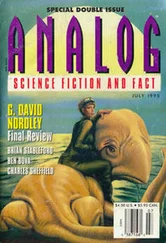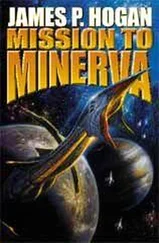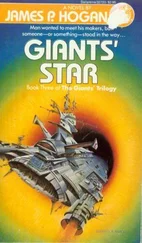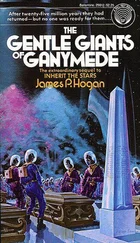James Hogan - Inherit the Stars
Здесь есть возможность читать онлайн «James Hogan - Inherit the Stars» весь текст электронной книги совершенно бесплатно (целиком полную версию без сокращений). В некоторых случаях можно слушать аудио, скачать через торрент в формате fb2 и присутствует краткое содержание. Жанр: Фантастика и фэнтези, на английском языке. Описание произведения, (предисловие) а так же отзывы посетителей доступны на портале библиотеки ЛибКат.
- Название:Inherit the Stars
- Автор:
- Жанр:
- Год:неизвестен
- ISBN:нет данных
- Рейтинг книги:3 / 5. Голосов: 1
-
Избранное:Добавить в избранное
- Отзывы:
-
Ваша оценка:
- 60
- 1
- 2
- 3
- 4
- 5
Inherit the Stars: краткое содержание, описание и аннотация
Предлагаем к чтению аннотацию, описание, краткое содержание или предисловие (зависит от того, что написал сам автор книги «Inherit the Stars»). Если вы не нашли необходимую информацию о книге — напишите в комментариях, мы постараемся отыскать её.
Inherit the Stars — читать онлайн бесплатно полную книгу (весь текст) целиком
Ниже представлен текст книги, разбитый по страницам. Система сохранения места последней прочитанной страницы, позволяет с удобством читать онлайн бесплатно книгу «Inherit the Stars», без необходимости каждый раз заново искать на чём Вы остановились. Поставьте закладку, и сможете в любой момент перейти на страницу, на которой закончили чтение.
Интервал:
Закладка:
A few weeks after the publication of UNSA’s interim conclusions, the Navcomms scientists on Ganymede held a celebration dinner in the officers’ mess at Pithead to mark the successful end of a major part of their task. The evening had reached the warm and mellow phase that comes with cigars and liqueurs when the last-course dishes have been cleared away. Talkative groups were standing and sitting in a variety of attitudes around the tables and by the bar, and beers, brandies, and vintage ports were beginning to flow freely. Hunt was with a group of physicists near the bar, discussing the latest news on the Ganymean field drive, while behind them another circle was debating the likelihood of a world government being established within twenty years. Danchekker seemed to have been unduly quiet and withdrawn for most of the evening.
"When you think about it, Vic, this could develop into the ultimate weapon in interplanetary warfare," one of the physicists was saying. "Based on the same principles as the ship’s drive, but a lot more powerful and producing a far more intense and localized effect. It would generate a black hole that would persist, even after the generator that made it had fallen into it. Just think-an artificially produced black hole. All you’d have to do is mount the device in a suitable missile and fire it at any planet you took a dislike to. It would fall to the center and consume the whole planet-and there’d be no way to stop it."
Hunt looked intrigued. "You mean it could work?"
"The theory says so."
"Christ, how long would it take-to wipe out a planet?"
"We don’t know yet; we’re still working on that bit. But there’s more to it than that. There’s no reason why you shouldn’t be able to put out a star using the same method. Think about that as a weapon-one black-hole bomb could destroy a whole solar system. It makes nucleonic weapons look like kiddie toys."
Hunt started to reply, but a voice from the center of the room cut him off, rising to make itself heard above the buzz of conversation. It belonged to the commander of Pithead Base, special guest at the dinner.
"Attention, please, everybody," he called. "Your attention for a moment, please." The noise died as all faces turned toward him. He looked around until satisfied that everyone was paying attention. "You have invited me here tonight to join you in celebrating the successful conclusion of what has probably been one of the most challenging, the most astounding, and the most rewarding endeavors that you are ever likely to be involved in. You have had difficulties, contradictions, and disagreements to contend with, but all that is now in the past. The task is done. My congratulations." He glanced toward the clock above the bar. "It is midnight-a suitable time, I think, to propose a toast to the being that started the whole thing off, wherever he may be." He raised his glass. "To Charlie."
"To Charlie," came back the chorus.
"No!"
A voice boomed from the back of the room. It sounded firm and decisive. Everybody turned to look at Danchekker in surprise.
"No," the professor repeated. "We can’t drink to that just yet."
There was no suggestion of hesitation or apology in his manner. Clearly his action was reasoned and calculated.
"What’s the problem, Chris?" Hunt asked, moving forward away from the bar.
"I’m afraid that’s not the end of it."
"How do you mean?"
"The whole Charlie business-There is more to it-more than I have chosen to mention to anybody, because I have no proof. However, there is a further implication in all that has been deduced-one which is even more difficult to accept than even the revelations of the past few weeks."
The festive atmosphere had vanished. Suddenly they were in business again. Danchekker walked slowly toward the center of the room and stopped with his hands resting on the back of one of the chairs. He gazed at the table for a moment, then drew a deep breath and looked up.
"The problem with Charlie, and the rest of the Lunarians, that has not been touched upon is this: quite simply, they were too human."
Puzzled looks appeared here and there. Somebody turned to his neighbor and shrugged. They all looked back at Danchekker in silence.
"Let us recapitulate for a moment some of the fundamental principles of evolution," he said. "How do different animal species arise? Well, we know that variations of a given species arise from mutations caused by various agencies. It follows from elementary genetics that in a freely mixing and interbreeding population, any new characteristic will tend to be diluted, and will disappear within relatively few generations. However"-the professor’s tone became deadly serious-"when sections of the population become reproductively isolated from one another-for example, by geegraphical separation, by segregation of behavior patterns, or by seasonal differences, say, in mating times-dilution through interbreeding will be prevented. When a new characteristic appears within an isolated group, it will be confined to and reinforced within that group; thus, generation by generation, the group will diverge from the other group or groups from which it has been isolated. Finally a new species will establish itself. This principle is fundamental to the whole idea of evolution: Given isolation, divergence will occur. The origins of all species on Earth can be traced back to the existence at some time of some mechanism or other of isolation between variations within a single species. The animal life peculiar to Australia and South America, for instance, demonstrates how rapidly divergence takes effect even when isolation has existed only for a short time.
"Now we seem to be satisfied that for the best part of twenty-five million years, two groups of terrestrial animals-one on Earth, the other on Minerva-were left to evolve in complete isolation. As a scientist who accepts fully the validity of the principle I have just outlined, I have no hesitation in saying that divergence between these two groups must have taken place. That, of course, applies equally to the primate lines that were represented on both planets."
He stopped and stood looking from one to the other of his colleagues, giving them time to think and waiting for a reaction. The reaction came from the far end of the room.
"Yes, now I see what you’re saying," somebody said. "But why speculate? What’s the point in saying they should have diverged, when it’s clear that they didn’t?"
Danchekker beamed and showed his teeth. "What makes you say they didn’t?" he challenged.
The questioner raised his arms in appeal. "What my two eyes tell me-I can see they didn’t."
"What do you see?"
"I see humans. I see Lunarians. They’re the same. So, they didn’t diverge."
"Didn’t they?" Danchekker’s voice cut the air like a whiplash. "Or are you making the same unconscious assumption that everyone else has made? Let me go over the facts once again, purely from an objective point of view. I’ll simply list the things we observe and make no assumptions, conscious or otherwise, about how they fit in with what we think we already know.
"First: The two populations were isolated. Fact.
"Second: Today, twenty-five million years later, we observe two sets of individuals, ourselves and the Lunarians. Fact.
"Third: We and the Lunarians are identical. Fact.
"Now, if we accept the principle that divergence must have occurred, what must we conclude? Ask yourselves-If confronted by those facts and nothing else, what would any scientist deduce?"
Danchekker stood facing them, pursing his lips and rocking back and forth on his heels. Silence enveloped the room, broken after a few seconds by his whistling quietly and tunelessly to himself.
"Christ…!" The exclamation came from Hunt. He stood gaping at the professor in undisguised disbelief. "They couldn’t have been isolated from each other," he managed at last in a slow, halting voice. "They must both be from the same…" The words trailed away.
Читать дальшеИнтервал:
Закладка:
Похожие книги на «Inherit the Stars»
Представляем Вашему вниманию похожие книги на «Inherit the Stars» списком для выбора. Мы отобрали схожую по названию и смыслу литературу в надежде предоставить читателям больше вариантов отыскать новые, интересные, ещё непрочитанные произведения.
Обсуждение, отзывы о книге «Inherit the Stars» и просто собственные мнения читателей. Оставьте ваши комментарии, напишите, что Вы думаете о произведении, его смысле или главных героях. Укажите что конкретно понравилось, а что нет, и почему Вы так считаете.


![Лаура Бренз - Потомственная ведьма[Inherit the Witch]](/books/79609/laura-brenz-potomstvennaya-vedma-inherit-the-witch-thumb.webp)








